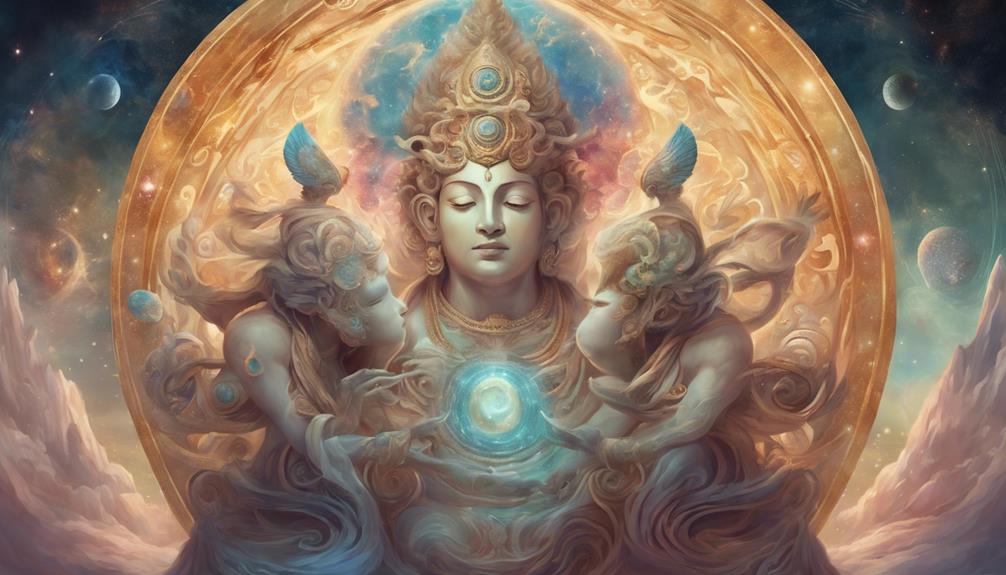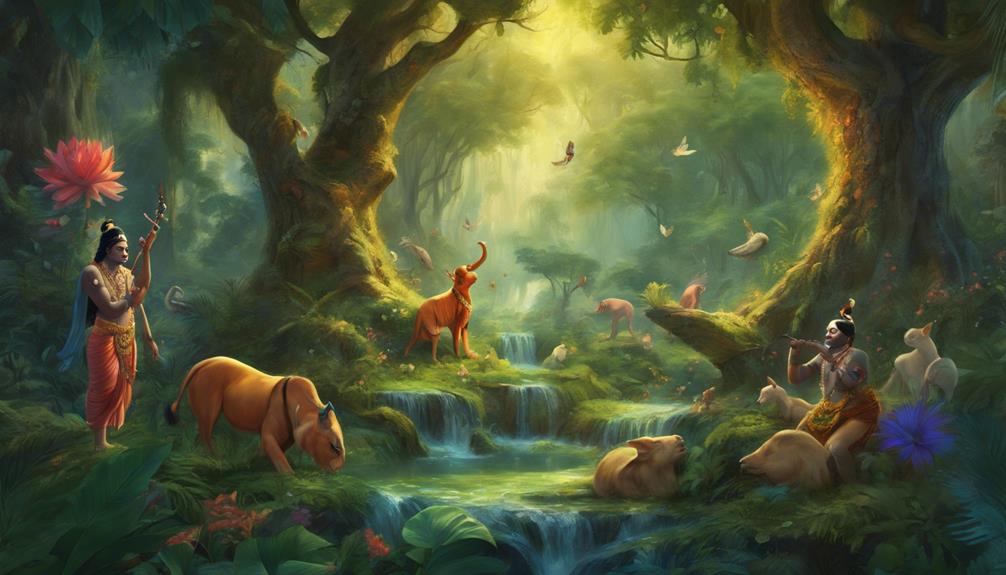Hindu gods such as Vishnu, Shiva, Brahma, Durga, and Krishna vividly illustrate the concept of reincarnation through their divine characteristics and roles in the cosmic order. Vishnu's avatars exemplify the cyclical nature of life, restoring balance and righteousness. Shiva symbolizes transformation and renewal through destruction, teaching the impermanence of existence. Brahma, as the creator, establishes the framework for reincarnation, emphasizing the evolution of souls through multiple lifetimes. Durga showcases the power of rebirth and personal growth, while Krishna imparts wisdom on duty and detachment, emphasizing the interconnectedness of the material and spiritual worlds in the eternal cycle of life and death.
The intricate depiction of reincarnation through these deities reveals profound insights into the spiritual complexities of Hindu mythology.
Table of Contents
Key Takeaways
- Vishnu's avatars demonstrate reincarnation's role in restoring balance and order in the universe.
- Shiva's destruction signifies transformation and renewal within the cycle of reincarnation.
- Brahma's creation establishes the framework for souls to evolve through multiple lifetimes.
- Durga's strength and resilience symbolize the power of transformation and rebirth.
- Krishna's teachings in the Bhagavad Gita emphasize duty, devotion, and detachment in the cycle of reincarnation.
Vishnu: The Preserver and Reincarnation
Vishnu, the Hindu deity known as the Preserver, embodies the concept of reincarnation through his various avatars. Within the Preserver's cycle, Vishnu takes on different forms to restore balance and order in the universe. Each avatar serves a specific purpose, reflecting different aspects of Vishnu's divine nature and teachings.
The notion of reincarnation is intricately woven into Vishnu's avatars, showcasing the belief in the cyclical nature of life, death, and rebirth. Through incarnations such as Rama, Krishna, and Matsya, Vishnu demonstrates the importance of upholding dharma, righteousness, and protecting the world from evil forces.
Vishnu's avatars not only illustrate the continuous cycle of life and death but also emphasize the idea of divine intervention to guide humanity towards spiritual evolution. By embodying different forms and fulfilling various roles, Vishnu's avatars offer lessons on morality, compassion, and the eternal truths that govern the universe.
In essence, Vishnu's avatars symbolize the interconnectedness of all beings and the eternal journey towards self-realization and enlightenment within the vast tapestry of existence.
Shiva: The Destroyer and Rebirth
The embodiment of destruction and rebirth, Shiva stands as a significant symbol of transformation within Hindu mythology. Shiva's transformation is deeply intertwined with the cosmic cycle of creation, preservation, and destruction. As the god of destruction, Shiva plays an important role in breaking down the old to make way for the new. This destruction isn't merely chaotic but is part of a greater cycle of renewal and rebirth.
Shiva's destructive nature isn't to be feared but embraced as a necessary component of the cosmic order. Through destruction, Shiva paves the way for regeneration and new beginnings. This cyclical process mirrors the eternal rhythm of life, death, and rebirth that's fundamental to Hindu beliefs.
In worshipping Shiva, devotees acknowledge the impermanence of life and the inevitability of change. By understanding and embracing Shiva's transformative power, individuals can find solace in the knowledge that even amidst destruction, there lies the promise of rebirth and renewal. Shiva's role as the destroyer and harbinger of rebirth underscores the intricate interconnectedness of all aspects of existence within the cosmic cycle.
Brahma: The Creator and Cycle of Life

In Hindu mythology, Brahma, as the Creator, plays a pivotal role in orchestrating the eternal and intricate cycle of life. Brahma's creation is an important aspect of Hindu cosmology, as he's responsible for bringing all living beings into existence. According to Hindu beliefs, Brahma creates the universe and all forms of life within it, setting the stage for the eternal cycle of birth, death, and rebirth.
Brahma's role in the eternal cycle is deeply intertwined with the concept of reincarnation. As the Creator, Brahma establishes the framework within which souls undergo the process of reincarnation, moving through different life forms based on their karma. This continuous cycle of life and death allows souls to learn, grow, and evolve over multiple lifetimes until they ultimately reach spiritual liberation.
Through Brahma's creation and the eternal cycle of life, Hindus find meaning in the interconnectedness of all living beings and the opportunity for spiritual progress through each birth. Brahma's presence in Hindu mythology serves as a reminder of the cyclical nature of existence and the potential for spiritual enlightenment through the journey of reincarnation.
Durga: The Warrior Goddess and Rebirth
A significant figure in Hindu mythology, Durga embodies the essence of strength and resilience, symbolizing the power of transformation and rebirth. As a warrior goddess, Durga's depiction highlights her ability to overcome obstacles and defeat evil forces, showcasing her role in protecting the universe. Through her battles and victories, Durga teaches individuals about the importance of perseverance and courage in their spiritual journey towards enlightenment.
Durga's association with rebirth is evident in her ability to destroy negative energies and restore balance to the world. This aspect of her character signifies the cyclical nature of life and the continuous process of renewal and regeneration. By worshipping Durga, devotees seek her blessings to navigate challenges and emerge stronger and wiser from life's trials.
The concept of reincarnation is intertwined with Durga's mythology, emphasizing the idea of shedding old layers of the self to embrace new beginnings. Her portrayal as a warrior goddess serves as a reminder that personal growth often requires facing adversity with resilience and unwavering determination on the spiritual journey towards self-realization.
Krishna: The Divine Play and Reincarnation

Amidst the intricate tapestry of Hindu mythology, Krishna emerges as a central figure embodying the divine play and the profound concept of reincarnation. Within the Bhagavad Gita, a sacred text where Krishna imparts spiritual wisdom to Prince Arjuna, the notion of the eternal cycle of life and death is prominently featured. Krishna's divine drama, showcased through his various exploits and interactions with mortals, serves as a reflection of the continuous cycle of birth, death, and rebirth that's fundamental to the concept of reincarnation in Hinduism.
Through his avataric incarnations, such as his role as the charioteer to Arjuna in the Mahabharata, Krishna symbolizes the divine descending into the mortal sphere to uphold righteousness and restore balance. This portrayal underscores the interconnectedness of the material and spiritual worlds, emphasizing the eternal nature of the soul's journey through multiple lifetimes. Krishna's teachings on duty, devotion, and detachment further elucidate the significance of embracing one's role in the eternal cycle of reincarnation with equanimity and understanding.
Frequently Asked Questions
How Does the Concept of Reincarnation in Hinduism Differ From the Concept of Rebirth in Other Religions?
When it comes to reincarnation beliefs, Hinduism's concept differs as it involves the transmigration of the soul based on karma. This sets it apart from other religions' views on rebirth, emphasizing unique cultural perspectives and practices globally.
Are There Any Specific Rituals or Practices in Hinduism That Are Believed to Aid in the Process of Reincarnation?
In Hinduism, reincarnation rituals and spiritual practices play a significant role in aiding the process of rebirth. These practices include prayers, offerings, and ceremonies designed to facilitate a smooth passage between one life and the next.
What Role Do Karma and Dharma Play in the Cycle of Reincarnation in Hinduism?
In the cycle of reincarnation in Hinduism, karma and dharma are pivotal. Your actions (karma) influence your future rebirths, and following your duty (dharma) can lead to enlightenment and liberation from this cycle.
Are There Any Specific Myths or Stories in Hinduism That Illustrate the Concept of Reincarnation?
In Hindu myths, reincarnation is vividly portrayed through various stories. These mythological depictions serve as symbolic representations of the cycle of life, death, and rebirth, revealing profound cultural significance and philosophical implications in Hinduism.
How Do Different Sects or Schools of Hinduism Interpret the Concept of Reincarnation Through Their Worship of Different Gods and Goddesses?
In Hinduism, deity worship reflects diverse sect interpretations of reincarnation. Different gods and goddesses embody unique aspects of this concept, providing devotees with varied perspectives on the cycle of life, death, and rebirth.
Conclusion
To sum up, the concept of reincarnation is intricately woven into the depiction of Hindu gods. Vishnu, Shiva, Brahma, Durga, and Krishna all embody different aspects of reincarnation, whether through preservation, destruction, creation, warrior-like rebirth, or divine play.
Through their stories and attributes, Hindu gods showcase the cyclical nature of life, death, and rebirth, offering believers a profound understanding of the eternal cycle of existence.